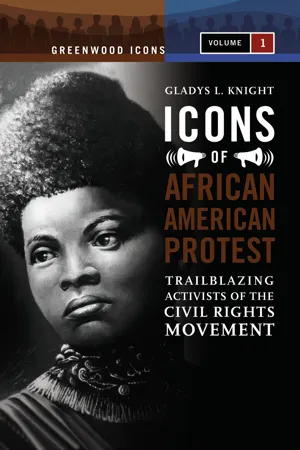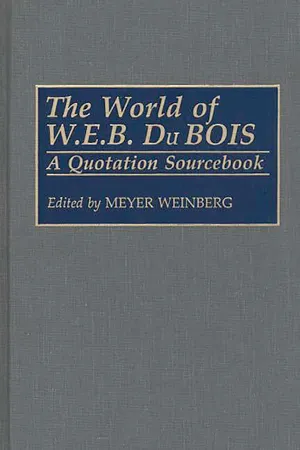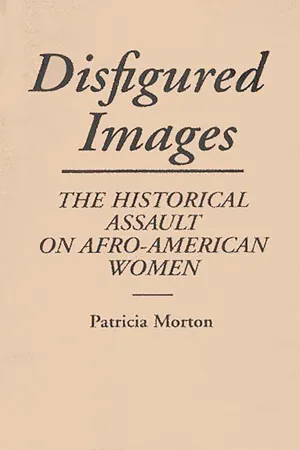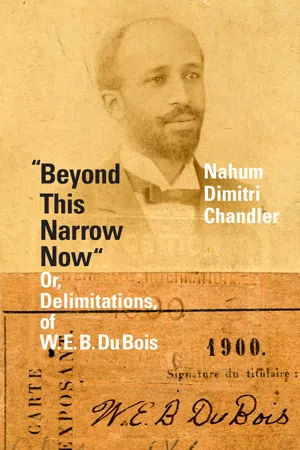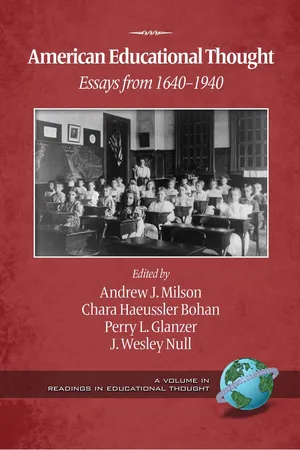History
WEB Du Bois
WEB Du Bois was a prominent African American sociologist, historian, and civil rights activist. He co-founded the National Association for the Advancement of Colored People (NAACP) and was a leading voice in the fight for racial equality and social justice. Du Bois's influential writings, including "The Souls of Black Folk," challenged racial discrimination and advocated for the rights of African Americans.
Written by Perlego with AI-assistance
Related key terms
1 of 5
8 Key excerpts on "WEB Du Bois"
- eBook - PDF
Icons of African American Protest
Trailblazing Activists of the Civil Rights Movement [2 volumes]
- Gladys L. Knight(Author)
- 2008(Publication Date)
- Greenwood(Publisher)
W.E.B. Du Bois (1868–1963) Library of Congress W.E.B. Du Bois was a prominent scholar, intellectual, writer, and editor. Born and raised in a predominantly white community in the North and edu- cated at Fisk (a leading historically black university in the South), Harvard (a predominately white Ivy League university), and the prestigious Univer- sity of Berlin in Germany, Du Bois was a prodigy among African Americans in the early twentieth century. He utilized his talents and influence to com- bat racism, segregation, and anti-black violence and promote the advance- ment of African Americans. Du Bois helped organize and participated in organizations such as the African American Council and the Niagara Move- ment. The National Association for the Advancement of Colored People (NAACP) was his greatest undertaking, and as editor of its organ, The Cri- sis, Du Bois became the foremost agitator, influential thinker, and commen- tator of his time. Through the written word—sociological studies, essays, articles, and books—Du Bois expressed himself freely, breaking down the Negro Problem and its various solutions, and displaying unprecedented knowledge of the social conditions, history, and culture of African Americans. He also lashed out with sharp criticism. His prolific and seminal writing reflected a com- plex man who espoused a broad array of methodologies. Among these were his advancement of the Talented Tenth, black self-defense, black capitalism, integrationism, Pan-Africanism, socialism, and communism. Above all else, he was unapologetically controversial. With the worsening of conditions for African Americans, Du Bois became progressively more radical and disillusioned, to the point that he moved to Ghana in 1961. Two years later, he renounced his American citizenship. On August 27, 1963, he died at the age of ninety-five. - eBook - PDF
The World of W.E.B. Du Bois
A Quotation Sourcebook
- Meyer Weinberg(Author)
- 1992(Publication Date)
- Greenwood(Publisher)
Page 1 Introduction W.E.B.Du Bois stands preeminent among intellectuals of the United States in this century. None wrote more of enduring importance or continues to be as relevant for our own day. Equally significant, Du Bois was an activist intellectual—he organized, protested, laid out programs, petitioned, and raised questions of longterm strategy and shortterm tactics. He mastered numerous forms of written expression: detailed scholarly investigations superior to many accepted models of research; vast investigative designs, stretching in one case over a century; editing of periodicals dealing more popularly with problems of the contemporary world; articles in learned and topical media; and sustained illumination in a new light of persistent issues ranging from the Reconstruction period of United States history to the relatively brief career of racism in world history. He was also a commanding speaker. To study his life and writings is simultaneously to study African American history. His published works and his correspondence are about and of that history. But these are also part of the general history of the United States. Du Bois wrote a great deal with white Americans in mind. He did not strive only to free blacks from oppression; he also worked to warn all Americans that democracy for them was equally endangered by racism. The major subjects of his writings range widely. Black people in the United States and the world were the foundation upon which the rest was built. He once wrote an essay contending that black colleges should start their curricula with special attention to black life and history. Then, the span of study should be broadened to include all of world civilization. This was, in fact, how Du Bois’s own thought progressed. To study blacks alone was not to do justice to the broad humanity of all blacks and of others. Black history from Africa forward appears throughout his writings. - eBook - PDF
Disfigured Images
The Historical Assault on Afro-American Women
- Patricia Morton(Author)
- 1991(Publication Date)
- Praeger(Publisher)
4 The All-Mother Visio n of W.E.B. Du Bo is Any exploration of the historiography of slavery must devote careful attention to the writings of W.E.B. Du Bois. As John David Smith has observed, he was the most "important black student of slavery in the pre-World War I period," and "led the black assault" on the dominant proslavery historiog- raphy. ! Yet how black women figured in Du Bois's historical writings must also be understood in the context of his analysis of contemporary race relations and his racial activism. Indeed, Du Bois was preeminent among those who rejected the accommodationist racial philosophy of Booker T. Washington. As Bettina Aptheker has observed, Du Bois was "a pivotal figure in the struggle of human rights and, consistent with this humanitarian impulse, he was strikingly advanced in his views on women." She has observed that he both recognized the immense power of "sexual myths and stereotypes" to divide the races, and "expressed many of the modern themes of the feminist movement." 2 W. E. Burghardt Du Bois was a steady, vocal, and activist advocate of the rights of women and of blacks. In his words, "the race question is at bottom simply a matter of the ownership of women; white men want the right to own and use all women, colored and white, and they resent any intrusion of colored men into this domain." 3 Moreover, he wrote much more about black women than did any other contemporary; his vision of black wom- anhood is significant from several perspectives. As a primary spokesman and shaper of the Afro-American intellectual tradition, Du Bois helps to illuminate the dilemmas of black scholarship in a racist society. As well, he was both a sociologist and a historian, and in wearing these two hats together, sometimes uncomfortably, he demonstrates in his writings the mixing and mingling of these disciplines of present and 56 Disfigured Images past, which characterized the scholarship of race during the Jim Crow era. - Edward Carson, Gerald Horne, Phillip Luke Sinitiere, Edward Carson, Gerald Horne, Phillip Luke Sinitiere(Authors)
- 2020(Publication Date)
- Routledge(Publisher)
11The current juncture of pervasive political and social crises coupled with deep and dramatic commemorative expressions about Du Bois contextualizes the importance of devoting an issue of Socialism and Democracy to his life, thought, and legacy. It is a unique material manifestation that enters into fruitful conversation with a vibrant and expanding stream of incredibly important work on the black intellectual published during the last half-decade that investigates both the origins and outcomes, indeed the transformation of his political and intellectual work from a reform-minded progressive in his early days to a true radical whose late career insights during the early Cold War advanced historical materialist arguments for economic democracy and political liberation. The articles in this issue tap into many of the liveliest directions in current Du Bois scholarship. While biography has been and remains a compelling yet challenging task in Du Bois studies as the thoughtful work of David Levering Lewis, Manning Marable, Shawn Leigh Alexander, and Bill Mullen show—along with Gerald Horne and Charisse Burden-Stelly’s insightful co-authored text—books and articles about his social theory, sociological practice, educational reflection, historical methodology, and global Pan-African politics as well as the publication of several of his untouched writings and manuscripts offer fresh consideration of Du Bois’s thought and legacy.12- eBook - PDF
Rewriting Exodus
American Futures from Du Bois to Obama
- Anna Hartnell(Author)
- 2011(Publication Date)
- Pluto Press(Publisher)
The chapter begins by summarizing the debates about Du Bois’ long career as a thinker on the subject of race, his sense of racism’s collaboration with organized religion, and how what he saw as this ‘unholy alliance’ between religion and racism came to undergird his thinking on colonialism. It will then trace the way in which Du Bois reconstructs a validated sense of group identity which, contrary to much thinking on Du Bois that dismisses him as an atheist, also involves the reha-bilitation of certain problematized religious concepts. I explore this movement through Du Bois’ oft-noted engagement with Hegel, but W.E.B. DU BOIS 71 then suggest that quite in contrast to Hegel’s projected merging of Christianity with the state – in the name of a unified national spirit – Du Bois hangs on to radical discontinuities and so rejects Hegel’s colonizing logic. For it seems that ultimately for Du Bois, the world, and not just America or even the African diaspora, remained his preferred horizon. The thrust of Du Bois’ thought is markedly transnational – with a view to achieving freedom for the minority within a transfigured conception of the nation-space. The Souls of Black Folk is my focus throughout, but my reading will be supplemented by other writings within Du Bois’ diverse body of works. RELIGION, THE ‘RACE CONCEPT’, AND THE COLONIAL CRITIQUE That Du Bois gave his semi-autobiographical 1940 text, Dusk of Dawn , the subtitle An Essay Toward an Autobiography of a Race Concept signals the absolute centrality of race to his life and thought. This reads: My life had its significance and its only deep significance because it was part of a Problem; but that problem was, as I continue to think, the central problem of the greatest of the world’s democracies and so the Problem of the future world. - eBook - PDF
"Beyond This Narrow Now"
Or, Delimitations, of W. E. B. Du Bois
- Nahum Dimitri Chandler(Author)
- 2021(Publication Date)
- Duke University Press Books(Publisher)
In providing this account, even though he does not declare it as a sci-entific contribution in itself, we may not be on the wrong foot to sug-gest that nonetheless Du Bois presents the perspective that he adduces as a contribution to understanding, in a political sense. It may be understood as an effort toward good social relations, a beneficence of knowledge that is rooted in the practice of scholarship and research—motivated by an effort to make critical sense of the world of the late nineteenth century and the century to come, that is the twentieth. Quite specific to Du Bois’s enuncia-tion is his own previous work in scholarship: the research for his doctoral dissertation project, from 1892 or so, and its final textual encoding, as pre-sented for the degree in 1895 and then published in 1896 as The Suppression of the African Slave-Trade to the United States of America, 1638–1870 (Du Bois 1896, 1973h). By the time of the preparation of the discourse of “The Development of a People,” Du Bois has been at work, thinking through the historicity that he offers as the concern of its core narrative for something on the order of a decade or more. In his essay, we are receiving knowledge by way of Du Bois’s emplacement, at the time of his writing, at the leading edge of scholarship on this dimension of modern historicity. 4. FOURTH NOTATION. This order of question was adduced by Du Bois in the opening stages of his essay “The Conservation of Races,” already, as it were, from early on in 1897. That is to say, everyday political and social and economic matters—such as “questions of separate schools and cars, wage-discrimination and lynch law” while always potentially decisive in the existential instance, remain overdetermined and may not in and of themselves, simply and discretely on their own terms, be of general im-plication or determination for thought and, eventually, for action. - eBook - PDF
- Andrew J. Milson, Chara Haeussler Bohan, Perry L. Glanzer(Authors)
- 2015(Publication Date)
- Information Age Publishing(Publisher)
American Educational Thought: Essays from 1640–1940, pages 425–447 Copyright © 2010 by Information Age Publishing All rights of reproduction in any form reserved. 425 26 Selected Writings of W.E.B. DuBois William Edward Burghardt DuBois (1868– 1963) began thinking and writing about the so- cial status of African Americans at an early age. He wrote articles for the New York Globe at age 15 and completed a doctorate at Harvard when he was 26. He was convinced that Blacks must push and agitate for social advancement to occur. He was opposed to the methods of “submission” and “adjustment” pursued by Booker T. Washington. DuBois wrote prolifi- cally and served as the editor-in-chief of Cri- sis magazine, published by the NAACP, for 25 years. His scathing editorials often provoked conflict with the NAACP leadership. DuBois grew increasingly frustrated by the persistence of racial injustice in the United States and the failure of Black leaders to be aggressive in their demands for change. He embraced radical social causes and ideologies, such as Pan-Africanism and communism, which alienated him from the mainstream. He lived in Ghana during the last years of his life and became a Ghanaian citizen shortly before his death in 1963. In the following selections, DuBois explains his views on the role of education in the social advancement of African Americans and his disagreements with the philosophy and methods of Booker T. Washington. —AJM 426 American Educational Thought: Essays from 1640–1940 Of the Training of Black Men, 1902 From the shimmering swirl of waters where many, many thoughts ago the slave-ship first saw the square tower of Jamestown have flowed down to our day three streams of thinking: one from the larger world here and over- seas, saying, the multiplying of human wants in culture lands calls for the world-wide co-operation of men in satisfying them. Hence arises a new hu- man unity, pulling the ends of earth nearer, and all men, black, yellow, and white. - eBook - PDF
The Problem of the Color Line at the Turn of the Twentieth Century
The Essential Early Essays
- W. E. B. Du Bois, Nahum Dimitri Chandler(Authors)
- 2014(Publication Date)
- Fordham University Press(Publisher)
5 In the collection offered here, the essay is presented in a discursive context internal to Du Bois’s own writings in such a way that its connection to his larger themes of modern history, the object of study of the social sciences in general and his thought of the global “problem” of the color line as it pertains to the African American in the United States come forcibly into view. Perhaps this presentation might allow a contemporary engagement with this text that would be able to remain contemporary to both Du Bois’s moment and our own. I suspect that the republication of this text in an immediate textual context that might allow a reading commensurate with that in it which 16 Introduction remains opaque to us could, by itself, make the present collection a worth- while contribution to contemporary intellectual work. In addition, mak- ing more widely available in the contemporary moment a document that shows how exacting and thorough was the idea of a project of African American studies that guided Du Bois at the beginning of the twentieth century has implication well beyond those concerned with his specific legacy, for it issues as an anachronistic interpellation of all contempo- rary projects of an African American studies and proposes the need for an ever more exacting replacement of Du Bois in the history of modern social thought. Such replacement concerns not only the situation at the turn of the twentieth century, which places him in epistemic contiguity with figures such as such as Émile Durkheim, Edmund Husserl, Georg Simmel, Wilhelm Dilthey, Sigmund Freud, Franz Boas, or Max Weber, but connects to all projections in the empirical study of forms of hierarchy and social stratification (including the study of colonial and postcolonial formations globally) in our moment, and has implication for the ongoing practices of an interpretive social science as it has been definitive of the past half-century of work in the human sciences.
Index pages curate the most relevant extracts from our library of academic textbooks. They’ve been created using an in-house natural language model (NLM), each adding context and meaning to key research topics.
